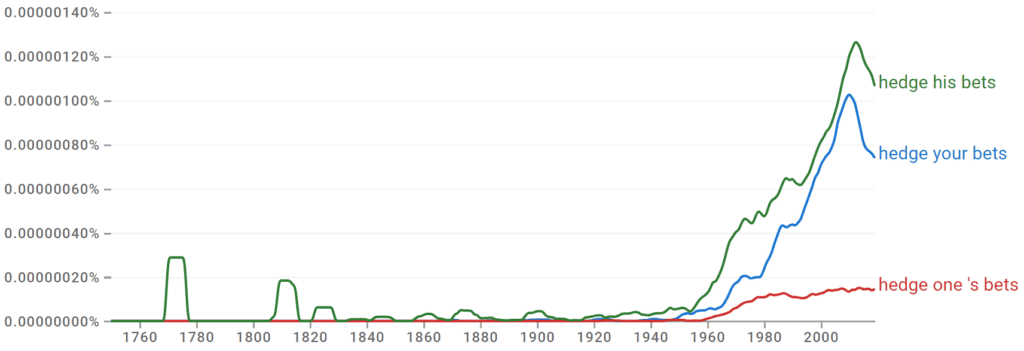Hedge your bets means to protect yourself against loss by choosing multiple options at the same time. This could apply to investing, gambling, or even life decisions—essentially any situation where you might face a loss due to unexpected events or poor planning.
As an idiom, the phrase has a figurative meaning that evolved from its original literal sense. Idioms like this are important in the English language because they add depth and nuance to what someone is trying to say.
Read on to learn more about its meaning, origins, and how you can use it for speech and writing.
Understanding Hedge Your Bets Meaning

To hedge your bets means to mitigate one’s risk. In other words, it’s about having a backup plan or alternative options to minimize potential loss. For instance, a gardener may hedge his bets by planting multiple types of tomatoes to ensure a good harvest in case one variety doesn’t flourish.
In finance, investors often hedge their bets by diversifying their portfolios, spreading their money across various types of investments to mitigate risk. In gambling, you might hedge your bets by placing a large wager on one outcome while also putting a smaller bet on the opposite result, thereby reducing the chance of a significant loss.
For example:
- At the start of the pro baseball season, I hedged my bets by picking standout players from multiple teams for my fantasy league.
- She hedged her bets at the racetrack by betting on the three top horses, increasing her chances of winning.
Hedge Your Bets Origin

The phrase hedge your bets traces its roots back to the 1600s and comes from the idiomatic use of the word “hedge.” Originally, a hedge was a physical barrier like a fence or shrubbery, commonly used to mark property boundaries or beautify an estate—done through the use of manicured vegetation, such as boxwood or roses.
The metaphorical use of a hedge as a way to dodge commitment or hide appeared in the late 16th century. People would say you were “hiding in the hedge” to avoid being noticed or making a decision.
By the 1670s, to hedge oneself meant to insure against loss. This idea was adapted from the term “to hedge in,” which meant to secure a debt by adding it to a larger one.
One of the earliest instances of the phrase appearing in literature is in Shakespeare’s “Merry Wives of Windsor,” written around 1600:
“…am fain to shuffle, to hedge and to lurch.”
John Donne used the idea of “hedging one’s debts” in a 1620 letter:
“You think that you have Hedged in that Debt by a greater, by your Letter in Verse.”
The phrase “hedging one’s bets” specifically appeared in George Villiers’ satirical play “The Rehearsal” in 1672, where it referred to the practice of minimizing losses on a bet by taking out smaller loans from different lenders:
“Now, Criticks, do your worst, that here are met; For, like a Rook, I have hedg’d in my Bet.”
Let’s Review
The term hedge has been used for centuries to convey the idea of avoiding full commitment or dodging risk. Whether you’re hedging your bets, hedging in a debt, or hedging yourself, the underlying concept is the same: you’re taking measures to protect against potential loss.
Today, hedging your bets is a commonly used idiom that means mitigating risk. It’s applicable to a wide range of scenarios, from financial investments to choosing which plants to grow in your garden.
Check out some others we covered:
